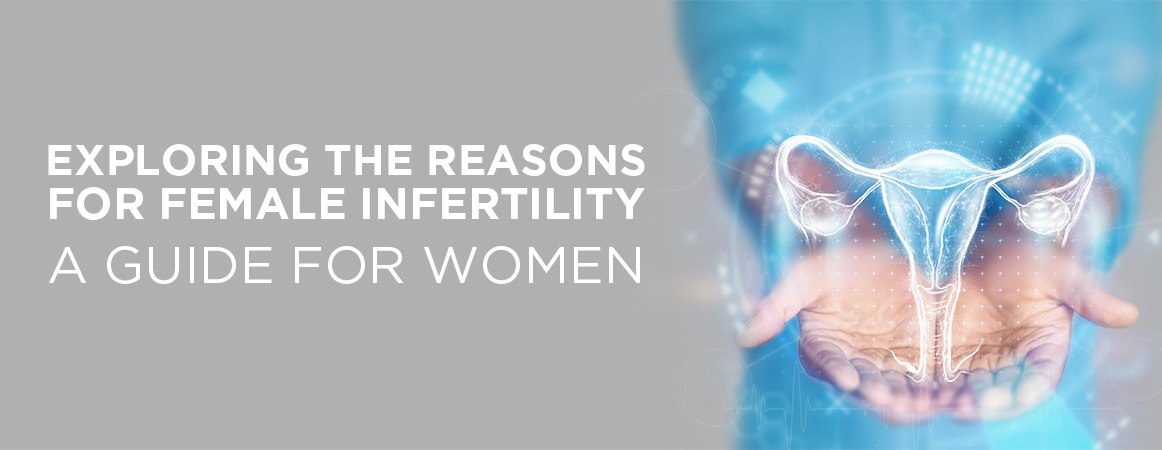Exploring the Reasons for Female Infertility: A Guide for Women
Infertility is a widespread issue affecting many women worldwide. While some women may conceive without complications, others may experience difficulties and require medical intervention. If you are struggling to conceive, it is essential to seek the help of a qualified gynaecologist who can guide you through the diagnosis and treatment process. MMI Hospital is the best gynecology hospital in Karachi that provides specialized care for female Infertility, with top gynaecologists in karachi who are experts in their field.
Infertility
Infertility refers to the condition where a couple is unable to achieve pregnancy even after one year of unprotected intercourse. This problem is prevalent worldwide and affects about 15% of couples. In about one-third of infertility cases, female infertility is the contributing factor. Several factors, including ovulatory dysfunction, tubal blockages, endometriosis, and uterine abnormalities, can cause Infertility.
MMI Hospital is a well-known medical institution in Karachi that offers a range of specialized services, including gynecology. With a team of experienced and knowledgeable gynecologists, MMI Hospital is the best gynecologist hospital in Karachi. If you’re looking for gynecologists in Karachi, MMI Hospital should be your top choice. The gynaecologists in their team have expertise in delivering top-notch healthcare services to women of different age groups. They can treat female reproductive system issues, including menstrual disorders, infertility, and menopause.
Medical reasons for not getting pregnant can include conditions such as polycystic ovary syndrome (PCOS), endometriosis, or certain genetic disorders.
Causes of Infertility in Women
Polycystic Ovary Syndrome (PCOS)
Polycystic Ovary Syndrome is a hormonal disorder commonly affecting women in their reproductive years. Females with PCOS have increased levels of male hormones, which can disturb their menstrual cycle and lead to irregular ovulation. This condition may also result in the formation of cysts on the ovaries, leading to infertility. However, with proper medical management, many women with PCOS can successfully conceive.
Endometriosis
Endometriosis refers to the maturation of tissue that is similar to the uterine lining outside the uterus, which can cause inflammation, scarring, and adhesions that affect the uterus, fallopian tubes, and ovaries. This condition can create difficulties in the movement of the egg from the ovary to the uterus, leading to infertility. Women with endometriosis may also experience painful periods and intercourse, affecting their quality of life. Treatment for endometriosis can include medication, surgery, or a combination of both.
Low Sperm Count
Female factors do not always cause low Sperm Count Infertility. Male Infertility is responsible for up to 40% of infertility cases. A low quantity of sperm, low movement ability of sperm, and abnormal shape of sperm can cause male infertility. Various factors, including genetics, lifestyle choices, and medical conditions, can cause these issues. Treatment for male Infertility can include medication, surgery, or lifestyle changes.
Tubal Factor Infertility
Tubal factor infertility ensues due to impairment or deterrent of the fallopian tubes, hindering the sperm’s ability to reach the egg or the fertilized egg’s ability to travel to the uterus. Tubal factor infertility can be caused by infection, endometriosis, or previous surgery. In some cases, the damage to the fallopian tubes may be severe enough that surgical intervention is necessary. Assisted reproductive technologies, like in vitro fertilization, can also be a possible treatment option in some cases.
Unexplained Infertility
Sometimes, couples may experience difficulty getting pregnant without any identifiable cause. This is known as unexplained Infertility. While it can be frustrating not to have a clear explanation for Infertility, effective treatments are still available. Unexplained infertility can be treated through various methods, including medication, surgery, or assisted reproductive technologies such as IVF.
These conditions can hinder or prevent the ability to conceive a child. In these cases, the gynecologists at MMI Hospital can provide treatment options to manage symptoms and improve quality of life. Other women may choose not to get pregnant for personal reasons, such as pursuing their careers, focusing on their education, or simply not feeling ready to start a family. Regardless of the rationale, it’s crucial for women to feel empowered in their choice not to conceive. MMI Hospital’s team of gynecologists specialist in Karachi can help women understand their options and make informed decisions about their reproductive health. They can offer guidance on various contraception methods, including birth control pills, intrauterine devices, and sterilization procedures. For women who are experiencing challenges with getting pregnant, MMI Hospital can provide support and guidance on alternative family planning options.
Experiencing Infertility can be a challenging and emotionally exhausting ordeal for women. MMI Hospital understand the unique challenges of Infertility and are committed to providing their patients with the highest quality care. MMI Hospital’s team of top gynaecologists is dedicated to helping women achieve their dream of becoming mothers.


